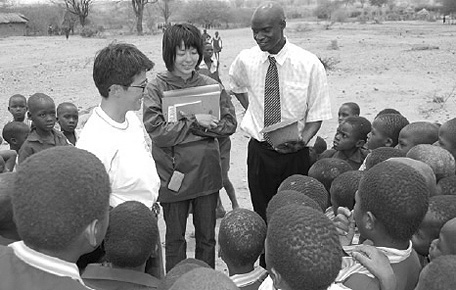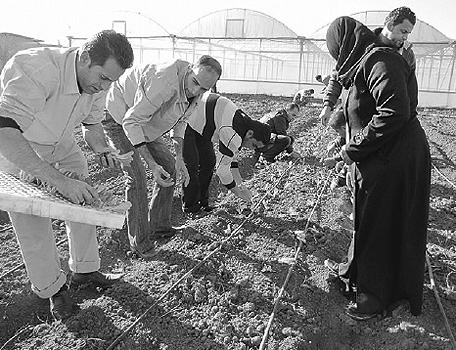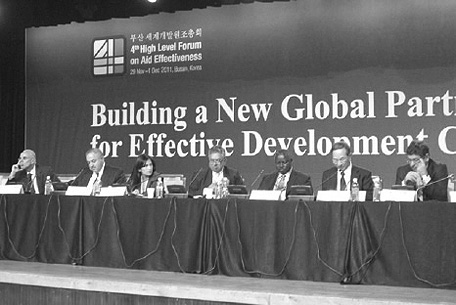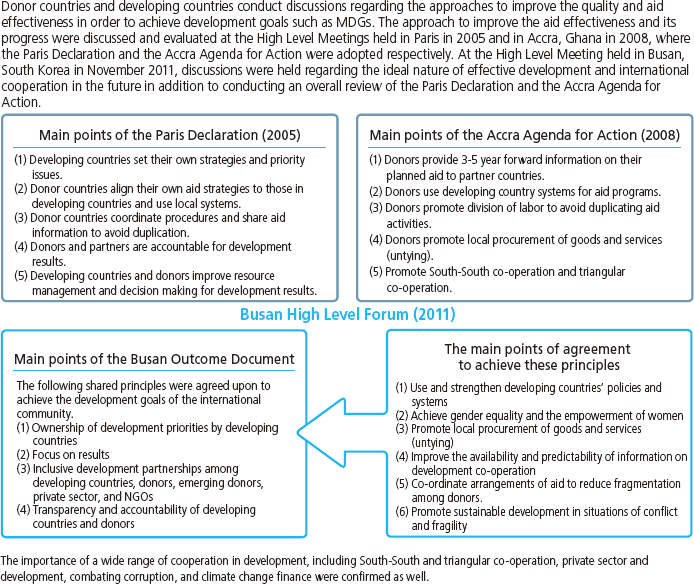Japan's Official Development Assistance White Paper 2011
(5) Partnership with Domestic and Overseas Aid-related Entities
Japan engages in international cooperation in partnership with private sector, NGO, universities, local municipalities, international organizations, and other donor countries.

Utilizing Grant Aid for Japanese NGO's Projects to build a well and restrooms at a school. Delighted children in Zimbabwe. (Photo: NPO ADRA Japan)
•Partnership with NGOs
In recent years, NGOs have fulfilled an important role in the international community by recommending policies on major diplomatic issues such as development, environment, human rights, trade, and disarmament. Japanese NGOs implement high-quality aid activities in developing countries, including education, health and medical care, community development, refugee assistance, and mine clearance. In addition, Japanese NGOs provide prompt humanitarian assistance in areas affected by conflict or natural disasters like earthquakes. NGOs are in tune to the needs of people at a grass-roots level in dire situations where governmental assistance has difficulty to reach. NGOs are deeply familiar with the region and are able to provide suitable response to the needs of people, as well as to enhance "Visibility of Japanese Aid." Japan has advocated the promotion of partnerships with NGOs in the ODA Charter and other policies. Japan engages in a variety of collaborative measures related to NGO aid activities, including financial assistance, capacity building program, and opportunities for dialogue between NGOs and MOFA.
a. Cooperation with NGO Projects
Japan cooperates in a variety of ways to enable NGOs to implement aid activities smoothly. For example, in FY2010, 46 organizations utilized Grant Assistance for Japanese NGO Projects, which provides funds to grassroots-level socio-economic development projects by NGOs, to implement 78 projects, including the construction of schools, assistance for disabled persons, vocational training, and improvement of maternal and child health. In addition, as of November 2011, 35 NGOs participate in the Japan Platform, an emergency humanitarian aid organization established in 2000 through a partnership among NGOs, the government, and the business community. The Japan Platform utilizes ODA funds as well as donations from private sector and individuals that have been contributed in advance to promptly distribute emergency supplies and medical assistance when a major disaster occurs. In FY2010, a total of ¥3.07 billion was disbursed for 74 projects in nine countries, including the one following earthquakes in Haiti and Chile, assistance for victims of flooding in Pakistan, and humanitarian assistance in southern Sudan, northern Sri Lanka, Afghanistan, and Pakistan.
In some cases, JICA's technical cooperation projects are outsourced to private sectors including NGOs, putting to use the expertise and experience of NGOs, universities, and a variety of other organizations. Further, as part of its ODA activities, JICA conducts "JICA Partnership Program (JPP)" to outsource projects that have been proposed by NGOs, universities, and local governments bodies that directly contribute to the improvement of the lives of local residents in developing countries. In FY2010 JPP has provided funds for 211 projects in 48 countries.

Utilizing Grant Aid for Japanese NGO's Projects to train agricultural engineers in the Gaza Strip in Palestine (Photo: NPO Campaign for the Children of Palestine)
b. Establishing Better Environment for NGO Activities
Further measures to support NGO activities include projects for establishing better environments for NGOs. For example, under the "NGO Consultant Scheme," staff of Japanese NGOs who have experience and a favorable record of performance are commissioned by MOFA to address inquires from the public and NGO stakeholders regarding NGO activities in international cooperation, or the management of NGO and development education. NGO consultants also provide site services at international cooperation events and conduct classes and seminars on the subject of international cooperation, and otherwise provide opportunities for many people to deepen their understanding of NGOs and international cooperation activities. Further, measures are taken to support NGOs in strengthening their organizations and capabilities, through hosting of "NGO study group" that serve as workshops and symposiums on such themes as fair trade and partnership between companies and NGOs.
JICA also provides a variety of training for NGO staff. For example, JICA conducts (i) training for NGO organizational strengthening through human resource development, (ii) method training in project management that utilizes project cycle management (PCM) to enable personnel to acquire project planning, proposal, and evaluation skills in developing countries, (iii) dispatching of advisors to strengthen NGO organizations with the aim of enhancing the ability of NGOs to engage in public relations and fundraising domestically, and (iv) dispatching of advisors to strengthen overseas NGO projects that provide expert guidance for the effective implementation of projects overseas.
c. Dialogue and Partnership with NGOs
Since 1996, MOFA has held the NGO-MOFA Regular Meetings to promote a stronger partnership and encourage dialogue between NGO and MOFA. NGO and MOFA are exchanging opinions regarding ODA policies and funding assistance for NGOs such as Grant Assistance for Japanese NGO Projects. Since 2002, the NGO-Embassy Meeting has been held to exchange ideas and opinion on the efficient and effective implementation of ODA among the staff of Japanese embassies, other assistance organizations and Japanese NGOs that work in developing countries. The meetings have been held in 28 countries, including Nepal and Sri Lanka. JICA also hosts the NGO-JICA Meeting in order to promote the realization of effective international cooperation and the understanding and participation of the civil society in international cooperation, based on an equal partnership with NGOs. In addition to supporting local NGO activities, Japan has also established an NGO-JICA Japan Desk in 22 countries to strengthen projects conducted jointly by NGOs and JICA.
Terminology
*Grassroots partner type
Technical cooperation program implemented by JICA to contribute to the social and economic development of developing countries at the grass-roots level in collaboration with partners in Japan, such as NGOs, universities, local governments and public interest corporations.
There are three types of JPP based on the size and nature of the organizations, which are classified as follows:
-Partner Type (Project amount not exceeding ¥100 million and to be implemented within 5 years)
-Support Type (Project amount not exceeding ¥25 million and to be implemented within 3 years)
-Local Government Type (Project amount not exceeding ¥30 million and to be implemented within 3 years)
*Fair trade
A method of trade that aids producers and protects human rights in developing countries by purchasing products at a fair price that is intended to facilitate self-reliance, in order to encourage trade that is not disadvantageous to producers in developing countries.
*Project cycle management (PCM)
The PCM method is a participatory development method of utilizing a project overview chart to manage operation of the cycle of analysis, planning, implementation, and evaluation of a development assistance project. It consists of participatory planning, monitoring, and evaluation. The technique is used by JICA and international organizations, etc., at the site of development assistance.
•Partnership with Private Business
a. Public-Private Partnership for boosting growth
Japanese private companies' activities in developing countries make significant contribution beyond ODA projects, by creating opportunities for local employment, augmenting tax revenue, expanding trade and investment, contributing to the acquisition of foreign currency, and transferring Japan's superior technology. In April 2008, Japan announced the "Public-Private Partnership for Growth in Developing Countries" a policy to strengthen partnership between ODA and private investment and to promote activities by private businesses in developing countries. Through this, the government receives consultation and proposals from private sectors related to their activities which are conducive to economic growth and poverty reduction in developing countries, as well as public-private cooperation projects together with ODA. Up to this point, two public-private partnership projects have been authorized. The first was a project to utilize Grant Assistance for Japanese NGO Projects to mine clearance and unexploded ordnance disposal from farmland when Japanese businesses conduct herbal medicine cultivation in Laos (see page 29). The other was a project to utilize technical cooperation to invite a team of Mexican physicians to Japan for training of sophisticated medical technology (catheterization surgery) that had been developed by a Japanese company.

Collaborating with Terumo Corporation to implement public-private partnership training for the first time. Mexican physicians were given practical training related to sophisticated medical technology. (Photo: JICA)
Japan utilize its scheme of Grant Assistance for Grassroots Human Security Projects and technical cooperation to implement projects by partnership with local NGOs or private corporations such as Corporate Social Responsibility (CSR) activities, in which private businesses aim to contribute proactively to the local communities they enter, and BOP business, which aims to deploy support business for a low-income demographic and contribute to improvement of their lives and a resolution of social issues.
Moreover, JICA began the Preparatory Survey for PPP Infrastructure projects and BOP business, a scheme for formulating project plans based on the proposals submitted by the private companies to conduct a preparatory survey as a feasibility study* for project formulation. JICA has selected 19 PPP infrastructure projects and 33 BOP business projects. In addition to utilizing the specialized knowledge, funds, and technology private businesses to resolve the development issues of developing countries, this gives a push to the overseas deployment of private business as well (see "Terminology" on page 29 for a description of BOP business and PPP).
The Reorganization and Rationalization Plan for Special Public Corporations announced in December 2001 stipulated that JICA Private Sector Investment Finance that provides direct investment/financing support when private enterprises do business in developing countries, would not be provided beginning in FY2002, except for projects that was authorized before the end of FY2001 and projects that were a continuation of such. However, due to an increase in the necessity of responding to new demands of high development impact through the private sector, the New Growth Strategy released on in June 2010 stipulated that Private Sector Investment Finance would be restarted within the fiscal year. Moreover, taking into consideration decisions made at the December 2010 the "Sixth Ministerial Meeting on Deployment of Integrated Infrastructure Systems," procedures needed for its restart at the end of March 2011 were completed, and JICA's Private Sector Investment Finance was started again. As a result, governmental review of a micro-financing project for the poor sector in Pakistan and an industrial human resources development project in Vietnam was completed in October 2011. In the case of the latter, in November 2011, a loan agreement was concluded with a private bank that will be the recipient of financing on the Vietnam side.
In addition, the "Ministerial Meeting on Deployment of Integrated Infrastructure Systems" was established based on the cabinet decision regarding "the Council on the Realization of the New Growth Strategy" (September 7, 2010 cabinet decision) to respond to the enormous infrastructure demand particularly in Asia, support efforts by private business in the infrastructure area, and make dynamic, cross-national, and political leadership. In this context, the Ministry of Foreign Affairs has appointed 122 "Specialist in Infrastructure Projects" at 57 overseas diplomatic missions in 49 countries (as of November 2011), to strengthen system for gathering information through overseas diplomatic missions, and enhance communication with related local organizations and chambers of commerce. In addition, The Prime Minister himself leads Japan's marketing effort to receive orders of infrastructure project.
(See "Terminology" on page 43 for a description of JICA Private Sector Investment Finance, New Growth Strategy, and Deployment of Integrated Infrastructure Systems.)
b. Acceleration of ODA Loans Process
Public-private partnership has become widely recognized as necessary for development assistance to developing countries. It is important to smoothly produce development effects through effectively organizing the assistance composed of ODA loans and private-sector business. From the standpoint of promoting effective public-private partnerships as well, further efforts are required to provide ODA loans at the same pace as implementation of private sector business.
While giving attention to ensuring accountability and appropriate procedures through such means as ownership on the recipient countries, the prevention of fraud and corruption, and considerations of environmental and social impact of projects, Japan announced a Measures to Accelerate ODA Loans Process in July 2010, with consideration to its "Measures to Accelerate ODA Loans Process" announced in 2007 and "Measures to Accelerate ODA Loans Process" by Expediting Public-Private Partnerships published in 2009. The measures announced in 2010 include additional actions such as the implementation of "pre-pledges," increasing the number of countries which hold on-site monitoring meetings and detecting problems at an early stage, and holding discussions regarding countermeasures.
c. Partnership with Universities and Local Governments
Japan utilizes the practical knowledge accumulated by universities, as well as local governments to implement ODA more effectively. JICA promotes the joint implementation of comprehensive technical cooperation and ODA loan projects to make it possible to utilize the specialized knowledge possessed by universities to address the challenges of developing countries. In addition, JICA cooperates with local governments to utilize their knowledge and experience to work toward qualitative improvement of ODA projects, development of human resources for aid activities, and vitalization of regional project development.
d. Partnership with Local Governments and NGOs of Developing Countries
Partnerships with local governments and NGOs in developing countries strengthen not only the socio-economic development of developing countries, but also lead to the strengthening of civil society and NGOs in those countries as well. Japan mainly utilizes Grant Assistance for Grass-Roots Human Security Projects to support socio-economic development projects implemented by aid-related personnel. This financial cooperation has also received high praise in developing countries as a detailed and rapid form of assistance that provides direct benefit at the grassroots level.
e. Partnership with International Organizations and Other Countries
In recent years, from the perspective of improving the quality of aid and aid effectiveness, various aid groups have been working to coordinate their development assistance policies to achieve international development goals and agreements such as the Millennium Development Goals (MDGs) based on the Paris Declaration and the Accra Agenda for Action (AAA). Currently, working groups have been formed according to each field such as health and education in many recipient countries, and program-type assistance is being implemented in accordance with the sector development strategy of the nation. Japan participates in many of these programs, such as agriculture project in Tanzania. Further, in 2005, Japan, the World Bank, the Asian Development Bank (ADB), and the UK's Department for International Development (DFID) have prepared a Joint-Strategy partners initiative for Bangladesh to support poverty reduction strategy (PRS). Subsequently, the Joint Cooperation Strategy (JCS) to Bangladesh was formulated in June 2010 with the participation of 18 development partners to work together in coordination and collaboration for more effective and efficient cross-sectors assistance.
Japan utilizes such opportunities as visits to Japan by top officials of international organizations like the World Bank to hold discussions for aid policy and other related issues. In 2007, Japan and ADB announced the Enhanced Sustainable Development for Asia (ESDA), and have worked to encourage investment promotion and energy efficiency. Recently, Japan has also been proactive in cooperation and collaboration with international organizations that have established headquarters in Japan. For example with the Asia Productivity Organization (APO), in addition to government-level cooperation private corporations contribute to the proposal of APO's policies through the Green Productivity Advisory Committee.
Moreover, Japan promotes initiatives that aim for an effective partnership of multilateral aid and bilateral aid. The object of this partnership is to reflect trends in international aid into the bilateral aid policies, which at the same time mainstreaming Japan's bilateral aid methods which have comparative advantage, within the recipient countries and the international community (see page 40 for details regarding Multilateral and Bilateral Aid).
In the past, members of the Development Assistance Committee (DAC) of the Organization for Economic Co-operation and Development (OECD) have been the main donor countries in the international community, but in recent years, non-DAC member countries such as China, India, Saudi Arabia, and Brazil that are referred to as emerging donors have begun to have a significant impact on the development of developing countries (see page 22 for details regarding Emerging Donors). Japan encourages emerging donors to participate in a variety of forums and holds discussions to enable those countries to provide aid in coordination with international efforts. For example, the Asia Development Forum was held in June 2011 to share the Asian experience in implementing development assistance. The Fourth High Level Forum on Aid Effectiveness was held in Busan, South Korea in November 2011. The creation of a new framework for cooperation to solve global issues in collaboration among DAC member countries including Japan, emerging donors, the private sector, and other organizations can be viewed as a significant step forward.

The Director of the JICA Research Institute participates in a session addressing South-South cooperation and trilateral cooperation at the "The Fourth High Level Forum on Aid Effectiveness" (Photo: JICA)
Terminology
*Feasibility study
Verification that a proposed project can be executive (achieved), and planning/formulation of a project that is suitable for implementation. An investigation regarding what possibilities the project has, whether it is appropriate, and what investment effect it will have.
*Specialist in Infrastructure Projects
Personnel assigned to individual overseas diplomatic missions to support infrastructure projects overseas, by gathering and consolidating domestic and overseas information regarding infrastructure projects, and by serving as liaison for communication and coordination with related organizations, chambers of commerce, etc.
*Green Productivity Advisory Committee
An advisory committee established in 2003 by the Asia Productivity Organization (APO) to provide advice and cooperation from Japanese companies that have a high level of environmental technology, in order to achieve a balance of improvement of green productivity and protection of the environment. There are over 60 companies currently participating.
Toward aid effectiveness

